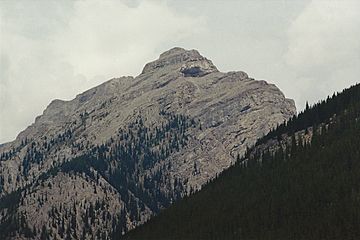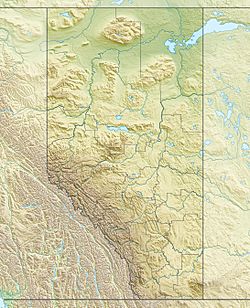Mount Aylmer facts for kids
Quick facts for kids Mount Aylmer |
|
|---|---|

Mount Aylmer, August 1994
|
|
| Highest point | |
| Elevation | 3,162 m (10,374 ft) |
| Prominence | 1,142 m (3,747 ft) |
| Geography | |
| Parent range | Palliser Range |
| Topo map | NTS 82O/06 |
| Climbing | |
| First ascent | 1889 by J.J. McArthur |
| Easiest route | moderate scramble on SW |
Mount Aylmer is a tall mountain located in Banff National Park in Canada. It stands at 3,162 meters (10,374 feet) high. This makes it the highest point in the Palliser Range and the tallest mountain in the eastern part of the Canadian Rockies.
Contents
Discovering Mount Aylmer
Mount Aylmer is a significant landmark in the Canadian Rockies. It is part of a larger group of mountains known for their rugged beauty. The mountain is a popular spot for adventurers and nature lovers.
How Mount Aylmer Got Its Name
The mountain was named in 1890 by a person named James J. McArthur. He was an important surveyor who explored many parts of the Canadian Rockies. McArthur named the mountain after his hometown, which was Aylmer, Quebec. This is a common way mountains and places get their names.
Reaching the Top: Climbing Mount Aylmer
Climbing Mount Aylmer is an exciting adventure. The easiest way to reach the top is by "scrambling." Scrambling is like a mix of hiking and easy rock climbing. It means you use both your hands and feet to move up steep, rocky sections. It's not as hard as full rock climbing, but it still requires good balance and strength.
When climbers reach the summit, they get an amazing reward. They can see incredible views of Lake Minnewanka below. This lake is one of the largest in Banff National Park. It is known for its clear blue water.
The Summit Registry Box
At the very top of Mount Aylmer, there is a special box called a summit registry. This box holds a book where climbers can write their names. It's a way to record who has made it to the top. It's like a guestbook for the mountain!
The names written in this box are very important. They are collected and kept safe in the archives of the Whyte Museum in Banff. This museum helps preserve the history of the Canadian Rockies. So, by signing the book, climbers become a small part of the mountain's history.
 | Emma Amos |
 | Edward Mitchell Bannister |
 | Larry D. Alexander |
 | Ernie Barnes |


